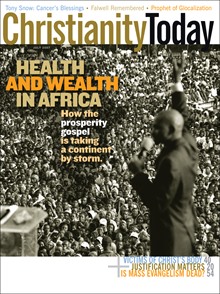Glocal Church Ministry

Christianity Today July 2007
Mark Galli, interviewer, “Glocal Church Ministry: Bob Roberts has an idea that may change American congregations, if not the world” Christianity Today (July 2007), pages 42-46.
I have often thought of the concept of glocalzation and questioned myself, “In what ways does a local church become global?” On one hand, the local church does not participate in the reality of the global dimension of God’s work: it is not a global church. On the other hand, the church with a global vision and scope should be deeply rooted in its local context. There should be a constant interaction between these two spheres of life: global and local. Any derivative ideas such as global leadership, global ministry, and global Christianity should have the same notion.
Roberts convincingly presents his contention that “a local church must be a global church.” He particularly underscores the importance of laity and their talents and skills for global ministry. It is impressive that he and his church have planted over 100 congregations and undertaken impressive social work in various parts of the world. Equally astonishing is that he has mobilized laypeople of his church for global ministry. His reflection, therefore, is based on his experience, thus, field-tested. Many of his practical suggestions have to do with the proper handling of human and financial resources for global mission, and I found them extremely valuable.
He is a reflective practitioner wrestling with a serious fundamental question which every Christian should ask, “When will Jesus be enough for you?” He firmly believes it to be always so, if we have the Holy Spirit, His living Word, and His presence with us. As Paul admonishes in Philippians 4:4, he argues that we should rejoice in the Lord, and do so always. Then he moves to the action level with the following question, “What does it mean for Christ to be enough?” His response to this question has been global church planting.
Roberts’ interpretation of the Great Commission (Matt. 28:19-20) is noteworthy: “I want to win the whole world, but I will not win the whole world as an individual or even as a single church” (p. 2). His answer was a corporate concept of “togetherness.” The clue was found in Acts 1:8: “But you will receive power when the Holy Spirit comes on you; and you will be my witnesses in Jerusalem, and in all Judea and Samaria, and to the ends of the earth.” The strategy of the Lord for his disciples was to receive power (how) and start first in Jerusalem (where). Winning the whole world with the whole body of Christ starts within local community.

Dr. Bob Roberts Jr. is the founder of Glocal Ventures and is the founding pastor of NorthWood Church near Dallas/Fort Worth, TX.
It is worth noting his view on transformation as the ultimate goal of Christian life: the transformation of “the community or a city somewhere in the world” (p. 3). Roberts well presents the purpose of planting church: not just make church grow in number but to exist for kingdom transformation. It is experientially evident that some Christians in this postmodern society are no different than secular people in their thoughts and way of living. Worse yet, we may be repeating the grave sin that Hosea (4:7) records, “the more the priests increased, the more they sinned against me….” We have more churches than ever before, we have more theological training schools and kingdom workers than ever before. Is our society transformed more than ever before? Finding the transformation formula is not quite hard: real transformation comes from God through power of the Holy Spirit. I am convinced that efforts of social concern are only a small part of real transformation. Foremost social transformation comes from God, because, when the Spirit works, a fundamental and internal change takes place, which continues on to external; hardly the other way around, unless social work deeply includes the living Word. Thus, it should be, “Come and hear the living Word,” rather than “come and hear my preaching.” Only then people will thirst no more, as experienced the Samaritan woman (John 4).
Category: Ministry, Pneuma Review, Winter 2008


